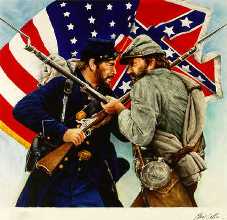The line wasn’t coined by Donald Trump. Every Republican who declared their candidacy for the presidency stated that we needed a president who will “make us proud again to be an American.”
It wasn’t that long ago when Democrats were rallying to “return America to greater standing in the world” and to find our “moral authority once again.”
I remember because I was one of the louder voices.
Only 8 years before that the battle cry was heard from a Republican running against Gore that we needed to “bring dignity back to the White House.”
Clinton, before that, ran against Bush Sr. and promised to return us to “a time when America was respected more than feared.”
A letter to the editor in the Des Moines Register criticized Obama’s foreign policies and finished with the proclamation, “We need to make America great again!”
Every time I hear that I ask myself, “What ‘great’ period are they referring to?”
I hear “return to greatness” from both sides of the political fence and I wonder, “What is the criteria for greatness?”
Apparently, the letter writer felt good about the way things were before Obama. Yet, the Bush era ended with economic catastrophe, and a foreign policy quagmire.
Maybe, they were referring to Clinton-era American pride. Clinton did balance the budget and maintained an extended period of prosperity, but, something tells me that wasn’t the writer’s intention.
 It wouldn’t be hard to imagine that many Americans wish for a return to the inspiration of Ronald Reagan and his “Shining city on the hill,” but, that was also when we first became a debtor nation from his fiscal inequities. Not to mention that the “Trickle Down” revival of neoliberalism (not to be confused with liberalism) created a divide between the Haves and the Have-nots that still tangle the economic debate.
It wouldn’t be hard to imagine that many Americans wish for a return to the inspiration of Ronald Reagan and his “Shining city on the hill,” but, that was also when we first became a debtor nation from his fiscal inequities. Not to mention that the “Trickle Down” revival of neoliberalism (not to be confused with liberalism) created a divide between the Haves and the Have-nots that still tangle the economic debate.
 Many Americans think of the great moral purpose of World War II and the recovery from the Great Depression as the greatest time in the history of America. Although to hear the conservative revisionists speak of FDR today, you would think that every failure since, social and economic, was the result of the New Deal.
Many Americans think of the great moral purpose of World War II and the recovery from the Great Depression as the greatest time in the history of America. Although to hear the conservative revisionists speak of FDR today, you would think that every failure since, social and economic, was the result of the New Deal.
Lincoln, perhaps the greatest philosophical genius to ever occupy the White House, presided over the greatest socio/political divide in history.

There is no doubt that seeds from separatism still exist to this day as we continue to fight challenges of racism.
So…what is the period of greatness that we all, at one time or another, want to get back to?
There are two things that happen when we consider our historical greatness. One is a natural human craving for nostalgia. Nostalgia is not built upon a remembrance of how things were; rather it comes from what we remember about how we felt at a certain time. We carry in our narrative the fact that we have survived, and we remember the moments of joy in the cracks and crevices of our struggles; we instinctively long for those feelings again.
Some of my happiest memories are from financially hard times long ago when I found laughs and inspirations in my journey. I yearn for them even today.
times long ago when I found laughs and inspirations in my journey. I yearn for them even today.
And two, we have a collective historical consciousness about the legacy and promise of America. We are aware of the unique place in world history that our Republic occupies and we have been taught what our forefathers fought for in defiance of tyranny.
We are raised on the traditions of patriotism and the stories of struggle and triumph that define our realization of freedom and human rights.
While our history is undeniably peppered with stumbles and falls toward realizing those principles, it is still a timeline of relative progress. Together, nostalgia and patriotism conspire to give us a sincere sense of what makes this country great and we perennially long to restore her to something that we remember.
My challenge for all of us is to ask ourselves, individually: “What is it that I believe in that makes America great?”
Does America follow the principles of freedom upon which a revolution was started? Do we continue to define and defend human rights?
We make a mistake when we put the responsibility of America’s promise solely on to the shoulders of politicians before we answer those questions ourselves. Only collectively, as citizens and politicians, can we define the moral directives that will restore our journey to freedom and guide us toward the realization of peace.
